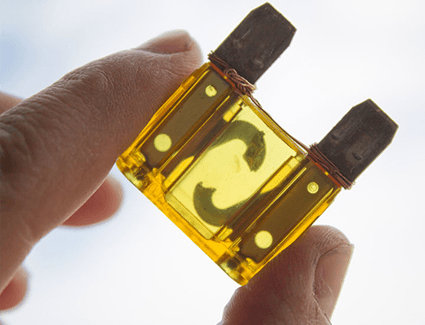

Electronic accessories are essential for your comfort and convenience in a modern car. If one of these features stops working on your car, the problem could be as simple as a blown fuse. But blown fuses can often be symptoms of deeper electrical issues under the hood. If you suspect a blown fuse on your car, read on below! We'll tell you all about automotive fuses, what they're for and how you can properly care for your vehicle.

5. What Fuses Are
Just like the fuse box or circuit breaker in your home, the fuses in your car are designed to protect your electronics from sudden surges of electricity. A fuse is a weak link in an electrical circuit designed to withstand just enough electrical power to run whatever is connected to that circuit. If excess current begins to flow through the circuit, the fuse will melt, interrupting the circuit and halting the flow of electricity. This protects fragile downstream components like the stereo and engine computer.

4. Where Fuses Are Located
On most every car, you'll find a primary fuse box under the hood. On modern cars, it's usually a plastic case with a protective cover. To access the fuses inside, just remove the cover. On the inside of the cover or in your owner's manual, you'll find a diagram that tells you what each fuse is connected to and what amperage each fuse should be rated for.
You might also find secondary fuse boxes in the interior. Commonly, you may find a fuse box behind a dashboard trim piece near the driver's footwell, but they can also be located in the trunk or under the seats on some vehicles. Check your owner's manual to be sure.
3. Fuses vs. Relays
Fuses are simple links rated for a certain amperage. For example, a blue automotive fuse with the number "10" printed on it is rated to withstand 10 amps. If a current greater than 10 amps reaches the fuse, it'll instantly melt and interrupt the circuit.
You'll also find larger, opaque little boxes inside the fuse box. These are relays. They work in much the same way as fuses -- they just pop into and out of their designated slots in the fuse box -- but they're responsible for connecting other circuits. For example, when you switch from your low-beams to your brights, turning the headlight stalk on the steering column engages a switch in the fuse box, completing the high-beams circuit.
Both fuses and relays can burn out if there is a surge or short in your vehicle's electrical system.

2. How To Check For A Blown Fuse
If a certain electronic component on your car has suddenly stopped working, try checking the fuse yourself! Some cars come with a fuse puller that can be stored in the fuse box, but if you've misplaced yours, just grab an ordinary pair of tweezers or needle-nose pliers. Use your owner's manual or fuse box diagram to find the fuse associated with the malfunctioning component. Just grab the fuse with your tweezers and pull. If the metal filament inside is still in-tact and in one piece, the fuse has not blown. That means there could be something wrong with the malfunctioning component itself. However, if the fuse has melted and a gap has formed inside the fuse, the circuit is incomplete. To restore the circuit, you'll need to replace the blown fuse with a new fuse of identical size and amperage.
1. How To Fix A Blown Fuse
Swapping in a new fuse may fix your problem temporarily, but a problem elsewhere in the system can cause frequent surges and shorts that'll cause the new fuse to blow, too. If there's a wire rubbing the wrong way in the wiring harness, a damaged electrical component or an improperly installed accessory, you might find the new fuse doesn't last very long! That means it's time to enlist the help of the pros. At Capitol Chevrolet, our service team has sophisticated tools and expert knowledge so we can fix your car's electrical problems for good.
Contact
2855 Maple Ave Ne
2855 Maple Ave Ne
Salem, OR 97301
- Contact: (503) 877-2943
Hours
- Monday 7:00 am - 6:00 pm
- Tuesday 7:00 am - 6:00 pm
- Wednesday 7:00 am - 6:00 pm
- Thursday 7:00 am - 6:00 pm
- Friday 7:00 am - 6:00 pm
- Saturday 8:00 am - 5:00 pm
- Sunday Closed

